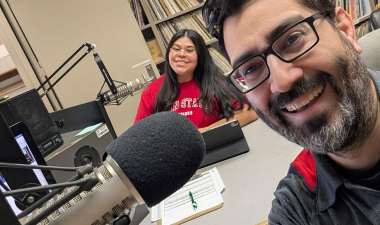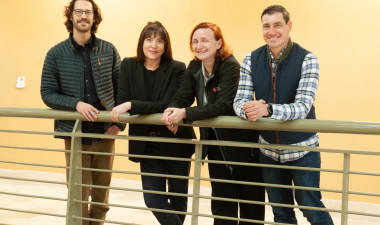Professor Emeritus Richard Luevano, who as a student activist led the campaign for ethnic studies to be taught at Stanislaus State, points to 1971 as the beginning of the program, the year its classes were no longer offered through the sociology program.
Officially, current Ethnic Studies Department Chair Xamuel Bañales said, and Luevano agrees, ethnic studies became its own program in 1972.
No matter how it’s measured, the 50th anniversary of the Ethnic Studies Department at Stan State lands in the 2021-22 school year, which also marks the start of an ethnic studies course being required for graduation for all incoming first-year students.
“It means a lot, especially now,” said Luevano, who began teaching ethnic studies at Stan State in 1972. “Being a requirement gives it a stronger standing.”
The law, AB 1460, requiring all new students enrolled in the 23 California State University campuses to take a 3-unit ethnic studies class, was signed by Gov. Gavin Newsom in August 2020. That gave campuses a year to prepare for additional sections of their courses.
The task at Stan State was made easier by groundwork Bañales and others had already done. Bañales began revamping and creating new courses after arriving on campus in 2016, handling about five a year until feeling they all were current and relevant.
Now, new instructors can step in to teach those 10 new sections of Introduction to Ethnic Studies with a model already in place.
To see such a robust Ethnic Studies Department is a marvel for Luevano, who taught until 2002, retiring after 30 years, most of them as department chair.
Luevano was a returning college student when he arrived at Stan State in 1968. He joined the Navy out of high school, his high school counselor never having guided the Mexican American student who’d taken college-prep classes to college applications. He got married and he and his wife spent 14 months teaching preschool in the Virgin Islands as part of VISTA — the arm of the Peace Corps that served U.S. states and territories.
He started at Stan State during a tumultuous time in the country, a time of protest and unrest. Luevano was inspired by the San Francisco State student boycotts for Black Studies, which ultimately led to that University creating the first Ethnic Studies Program in 1969.
Luevano enlisted classmate Art Amaro during his first term at Stan State, and they slowly rallied other students. They created the Minority Student Alliance. They talked with administrators and convinced both President Alexander Capurso and his successor, Carl Gatlin, of the need for ethnic studies.
The students had a voice in creating ethnic studies course offerings. Luevano helped design and teach the first course, The Contemporary Mexican American, in spring 1970.
He graduated that May, completed a master’s in Chicano Studies at San José State and the next year returned to Stan State as the director of financial aid in fall 1971. The following spring, he filled in for an ethnic studies professor who’d left after one term, and in fall 1972, became one-of-two full-time instructors in the newly created Ethnic Studies Program.
“Our theme at the time was history, culture and perspective,” Luevano said. “Perspective is extremely important to understanding another culture.”
Fifty years later, it still is.
The current program, which began offering ethnic studies as a major in 2010, centers on histories, contemporary experiences and cultural expressions of Native American/Indigenous people, Black/African Americans, Chicano/a/xs-Latino/a/xs, and Asian Americans and Pacific Islanders within a regional, national, and/or global context. It incorporates scholarship, art and community engagement.
Luevano organized a 25th anniversary celebration of ethnic studies in 1997, an event that drew 450 people.
A 50th anniversary event for the program is planned for the spring of 2022 Bañales said, even though most programs at most universities, including Stan State, celebrated the golden anniversary of the ethnic studies field in 2019.
The speakers at Stan State’s 2019 celebration were original members of San Francisco State’s Third World Liberation Front strikers and Black Student Union, as well as LaNada War Jack, the first Native American student admitted to UC Berkeley. He also invited Amy Sueyoshi, dean of the College of Ethnic Studies at San Francisco State, to present on Queer Ethnic Studies, to show how the field has evolved.
“It was important for our students to see and connect with them, because our students are the current and next generation to enact social change,” Bañales said.
“I’m sure people thought the young activists of the late 1960s were ignorant or idealists and were never really going to have the power to create ethnic studies. Some dreams become reality, however. Students at San Francisco State went on strike for months and fought for ethnic studies, and we now have classes, programs and departments, and we have faculty teaching.”
Assemblywoman Shirley Weber (D-San Diego), a force for education throughout her career, proposed the CSU Ethnic Studies requirement that is now law.
If it meant a year of meetings at the campus and state level to implement the law and oversee the hiring of new faculty in addition to teaching and directing responsibilities, Bañales understood the benefits.
“I see ethnic studies as a form of medicine,” Bañales said. “When people are exposed to these classes, there’s a certain level of understanding and healing that comes with it. We really do need those as a nation and in the world. It is important to move forward where we build together and are not divisive.”
It’s what Luevano, a third-generation Mexican American, knew in 1968 when he planted the first seeds of the program at Stan State. And it’s what he hopes today’s students and future generations will come to understand.



